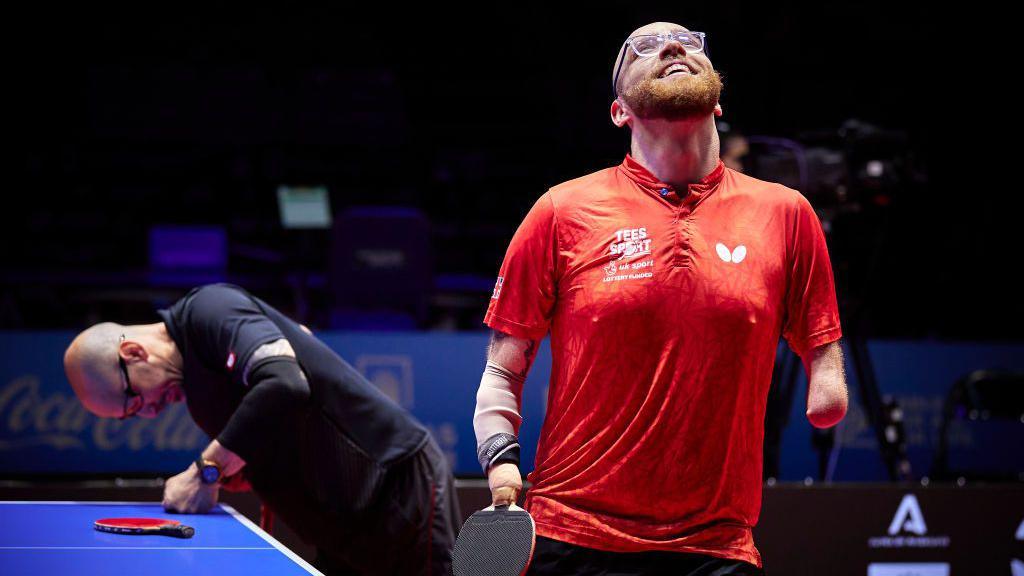'Playing table tennis with no hands is stupid - but I love it'

Martin Perry will be playing at his first Paralympics after qualifying for Paris 2024
- Published
There are few sportspeople who describe their choice of discipline as “absolutely stupid” – but Martin Perry is not like most athletes.
The table tennis player from Drumchapel in Scotland is heading to Paris as part of the ParalympicsGB team, having secured his place at the Games at the third attempt.
Perry, 30, was born missing both hands and one leg, but after trying table tennis at a summer camp aged 16 has never looked back.
Now, after trying and failing to make both the 2016 Paralympics in Rio and the delayed 2020 Games in Tokyo, he has finally realised a dream.
All you need to know for the Paralympics
- Published28 February 2024
"Choosing to play table tennis when you've got no hands is nothing short of absolutely stupid, but I have so much fun when I play,” he told the BBC’s Sally Hurst.
“I travel the world, it has given me a career, a purpose, and obviously the goal of getting to the Paralympic Games.”
When he started at 16, Perry played with a bat strapped to his arm with Velcro in rudimentary fashion.
"I just fell in love from that day," he said. "I didn't think I was going to become a Paralympian, it was about going to have fun and make new friends. Then it slowly took over my life."
Now he has a specially modified bat, moulded to his right forearm with a rubber sleeve for grip. He also plays in a shortened running blade standing in for a false leg, to allow him to get lower to the table.
It is all part of the adaptations Perry has to make in order to play table tennis. But he takes it in his stride, with a fortitude he says comes from his childhood.
"People often say I must have great resilience, but it's not something I think about,” he said.
“It comes from my upbringing, my family was not going to wrap me up in cotton wool - if anything, they were going to protect the world from me, I was this little boy running round with three brothers causing havoc. That is what led me to be the person I am today.”
'I bawled my eyes out after qualifying'
Family still means a lot to Perry. As well as the challenge of reaching the Paralympics, he and wife Siobhain Forbes also recently welcomed their first child, Beira.
Perry, who describes fatherhood as “the promotion I never knew I was getting”, says it was Siobhain who picked him up after the disappointment of missing the Games three years ago and set him on the path to qualifying for Paris 2024.
"It was really tough mentally not qualifying for Tokyo,” he said. “I was playing the best table tennis I had ever at that point. It took a lot of strength to get back on the table and enjoying it.
“I owe a lot of that to Siobhain, she dragged me kicking and screaming to get back on the table. That setback really ignited a fire to pursue Paris.”
Siobhain, meanwhile, says she never doubted her husband.
"He is so determined, he will not stop at anything in life,” she told BBC Sport. “Not just table tennis. The only things he can't do are buttons or shoelaces.”
Qualification was secured by Perry at a tournament earlier this year, and he will compete in the class 6 category of the men's singles in Paris.
Players in this class are able to stand, but they have severe impairments in both their arms and legs due to a range of disabilities, including absence of limbs or amputations. Some players even handle the racket with their mouths.
Perry recalls being overwhelmed by emotion on realising a lifetime ambition.
"I only officially found out I was qualified while I was still competing,” he said. "I remember winning the match, I looked at my coach, I said 'I think I'm in', and he said 'yeah, you are'.
“I stepped over the barrier to the court, sat down and bawled my eyes out. So many years of doubting myself, hours of hard work on the table, it was 14 years of relief.”
He did still have the wherewithal to play a trick on his wife, for which Siobhain has just about forgiven him.
"I was more annoyed at the beginning because when he found out he was going to Paris he sent me a photo of him crying at the side of the court, so I asked 'did it not go well?', and he was like 'no, I qualified',” she recalled.
“Once I wasn't angry about that mean prank, I was so proud. He has done so much to make sure he qualified, he went to America in January when the baby was four weeks old, he was in training three days after she was born. He wanted to be at home, but he was out training.
"This is the height of all Para sport. He has done well in the last year, but still didn't think he was going to qualify. He went to Kazakhstan at the start of March for a tournament and it went badly, and it was hard to watch.
"I was worried for him, I know it means so much to him. But we really wanted it as a family, so it was a stressful and emotional time.
"Then for him to phone me and say he has qualified, it was tears of joy. I was embarrassed crying in public, but I'm so proud of him."